PUBLISHED SEPTEMBER/OCTOBER 2021
interview by
Alexa Schlosser, Managing Editor,
IBPA Independent magazine --
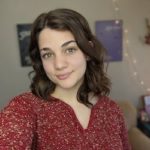
Hannah Kidder
An interview with contemporary and fantasy author, writing coach, and YouTuber Hannah Lee Kidder.
Hannah Lee Kidder is a contemporary and fantasy author, writing coach, and YouTuber. She’s published two short story collections,
Little Birds and
Starlight. Her hustle-minded approach to self-publishing includes finding alternative revenue streams based on skills she already has.
You’ve published two short story collections. How did you initially decide you wanted to self-publish Little Birds? How did you launch the first collection? Did your approach to publishing, marketing, etc., change for the next collection, Starlight?
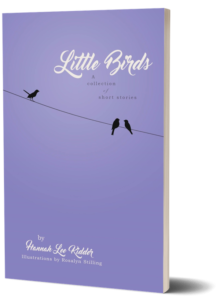 Little Birds by Hannah Kidder.
Little Birds by Hannah Kidder. came about when I had some time on my hands and a stack of short stories I’d published in college. Since they were already published traditionally, there was nothing else I could do with them—unless I wanted to self-publish.
I had the intent to write a novel, but I wasn’t sure if I wanted to go the self-pub route or do it traditionally, so I put my old shorts together, wrote a couple new ones, and tried out the self-publishing process. I learned a ton, and I realized that self-publishing was a lucrative and fulfilling endeavor for me, so I decided to stick with it for a while.
I went into
Starlight with more intent and specific goals, because I knew what to expect for the process and my sales. I invested a little more in the book production, avoided a few mistakes I’d made the first go-round, and ended up selling more copies of
Starlight in my release week than I had for the entire first year of sales for
Little Birds.
I go in-depth about the differences in my approaches between the two collections in my
Skillshare class, “
How to Publish a Collection: Shorts, Poems, Essays”.
I understand you’re also a writing coach and YouTuber. Did you start those ventures before or after publishing your collections?
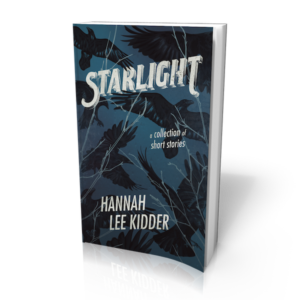 Starlight by Hannah Kidder
Starlight by Hannah KidderIn 2018, I turned down a job offer the week before I was supposed to move out of state to start it. A family member was seriously ill, so I decided to stick around my hometown. I’d already graduated, there were no local jobs in my industry, and I had nothing but time. So, I sat down and made a list of every skill and resource I had available to me, which led me to laying the foundation for my current career.
I privated my old teenage vlogs and rebranded my YouTube channel as a writing channel. I always liked doing YouTube, but my videos never had much of a focus, so it was just something I dabbled with out of boredom for several years.
With a niche established, my channel grew. It’s so hard to start from scratch on YouTube, so I’m glad I still posted videos to that channel while I was in college because I had a handful of active subscribers still around. The writing services and classes came a few months later as my audience grew and viewers started requesting more writing help. In the next year or two, I plan to swipe all of my current services and replace them with an indie writer incubator to work longer term with more dedicated clients to help them write, market, and build their author platforms.
A lot of authors just want to write their book and get people to buy and read their book. You’re a writer, but you’re not just a writer. In addition to writing, coaching, and YouTubing, you offer workshops, manuscript critiques, professional development help, social media makeovers, and more. Tell me about this philosophy of side hustles and alternative revenue streams. Is the goal to diversify your opportunities to make money? Build a brand?
I think most authors’ ultimate goal is to write full time or at least most of their time. My goal was to be selfemployed, so I just used writing as my base and branched from there. A diverse stream of income is incredibly important for self-employed people to have financial stability, so while I will always have multiple streams of income, I’m always looking for new ways to commit more of my time to writing.
Finding ways to streamline content production (creating in batches, hiring out and delegating, simplifying the content, etc.), setting up passive streams of income (for example, Skillshare classes pay me monthly for years after a few weeks of initial setup), and other time-saving structures allow me to keep my diverse income stream while dedicating more and more time to writing and other endeavors that I get more personal fulfillment from. The indie writer incubator will be a lot of upfront effort, but after I’ve set up the structure of it, that should also be a fairly low-effort way to bump up my non-writing income.
Tell me a little about Skillshare. How does it work, and do you have any tips for those interested in doing something similar?
Skillshare is a great platform. I’ve found success on it, and even with only two classes, I get a check every month from royalties of those classes. The payback for a little initial effort has been amazing. If you have a demonstrable skill or expertise in a specific area, I definitely recommend looking into producing classes somewhere like Skillshare or Udemy. Each platform will have a rundown of best practices, so definitely give those a thorough read before you produce the class.
Many of our readers are likely intrigued— and maybe even intimidated—by the idea of being a YouTuber. What made you try it out, and what have you learned along the way? Do you have any advice for other authors and publishers looking to build a YouTube platform, or even just create a video?
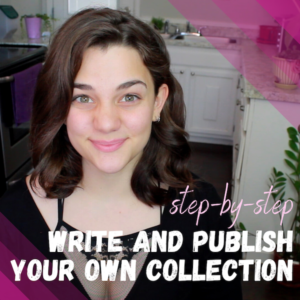 The thumbnail image for Hannah Lee Kidder's class on Skillshare.
The thumbnail image for Hannah Lee Kidder's class on Skillshare.I feel like a lot of indie authors think they need to have a platform on YouTube because they’re getting their advice from indie authors who have a platform on YouTube. I honestly only did it because I already had the skills required and that starter pile of subscribers to boost my platform. If YouTube doesn’t feel right, don’t stress about forcing it. If you want to try it out, go for it! It’s been a fantastic platform for me, but it’s just not for everyone.
I suggest doing the same thing I did before I started my channel up again: Write a list of your skills and assets. What do you have available to you, and how can you utilize that to build your author platform? Mine happened to include YouTube. When I wrote that list a few years ago, it looked something like this:
- Good at writing
- Good at marketing
- Connections with successful authors I met when they were my university professors
- Number of YouTube subscribers on a semi-dead channel
- Number of followers on other social platforms
- Lots of time on my hands
- Adobe Suite
- Canon Rebel t3i
- Professional development experience
- Editing experience
- Good at making friends
- Good at figuring out what people need to do to accomplish their goals
And so on. As you can see from the items, I utilized most of those resources. You might have strengths and not even realize it—like maybe you have a really strong support group of friends and family who are eager to help you reach your goals. Having 30-60 people you already know who might be interested in what you’re offering or creating is huge. Maybe you have a spare room you can allocate as an office. Maybe you have a great eye for floral arrangements, and you can use those in aesthetic posts on Instagram promoting your books. Literally any skill, software, physical space, or friend/connection you have can be a strength. I know it’s overwhelming starting out, but really make an assessment about what you have available to you, then think critically about each of those items and how you can utilize them to reach your goals. You can build from there—but start where you are with what you have. That said, if you are interested in YouTube, here are a few pieces of advice I have:
Know that it’s hard. If you’re starting from nothing, building an audience on YouTube right now is the most unforgiving it’s ever been, and it’s only going to get harder. Apart from that, there’s a huge learning curve if you’ve never done it before. Lighting, scripting, filming, editing, SEO, metadata—it’s a lot to learn! I don’t say this to discourage you, but to encourage you that if you have a rough start, so does everyone. Expect the worst and hope for the best, and don’t let a slow and frustrating start scare you away.
Do the best you can with what you have. I wouldn’t suggest you dump hundreds or thousands of dollars on equipment and software from the jump. There are free editing programs. A 720p webcam is fine to start out. You don’t need a light setup if you have a window. Give it a shot, and make sure it’s for you before you invest a lot of money into it. I’ve seen so many people start at a sprint when they should have started at a stroll. Maybe a power walk, at the most.
Look at what other people are doing. I’m not saying copy content, but find your competition. What are they covering? Copy their tags, snatch a few words from their title and description, and you’ll probably end up in suggested videos for viewers who watch that channel. Funnily enough, looking at my competition made me change the type of content I was making in the opposite direction. If you watch my earlier videos, I was giving pretty run-of-the-mill writing advice because I didn’t know that there were so many creators doing the exact same thing.
When I realized there was an entire genre of YouTube that was essentially creators parroting advice phonetically that they couldn’t actually apply to their own writing, I switched up what I was doing. I started making content about personal branding, marketing, workflow, and more complex writing topics. I started doing editing demonstrations to show how to apply the advice, and that set me apart from other content creators covering the same topics.
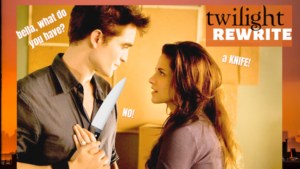 Experiment!
Experiment! Especially when you’re starting out, try different stuff. Emulate other people’s content, come up with your own ideas, do a mix of the two. See what works, see what you enjoy, and see what resonates with people. I’ve done film reviews, writing advice, collabs with other writers, a series where I rewrite the
Twilight books. I did sketches, vlogs, demos, reviews, all of it— and that’s the only way I learned what I really enjoy and what my audience is interested in seeing. One thing that really surprised me, for example, was that people are pretty into my reflective vlog content. After I finished my first novel draft, I made a video talking about how I felt about it. That was it. It was so low-effort, and I thought it would get a handful of views, but it was one of my better performing videos. And it was easy. I never would have expected that response. So, try out as many topics and formats as you’d like before you settle into a niche.
What excites you about publishing right now?
From an industry perspective, I’m thrilled at how much indie publishing has grown. There are so many barriers to entry in traditional publishing that have nothing to do with quality or marketability. I love that there’s an alternative way for people to tell their stories. On a personal level, I’ve got so many works in progress that I’m so stoked to dig into. I’m touching different genres, I’m experimenting, and I’m growing as a writer. I’m very excited to release some new and different content and see what my readers think.
What’s on the horizon for you? How do you choose your next project/service?
I’ve got a pretty tight book production schedule right now. A fantasy duology (and possible prequel), a romance series, a grim dystopia short collection, a poetry collection, a nonfiction—the list goes on. I’m allocating more and more time to writing each month, and I’m so excited to see my publications snowball as I get better at it and hone a quicker turnaround.
After I’ve nailed a few novel releases, I’m very excited to open my indie writer incubator program to help authors build their platforms and finish their manuscripts. I’m also going to publicly offer my first one-on-one indie writer consultation program, which has previously only been available to my patrons. Essentially, I’m looking to narrow my focus and offer fewer, stronger services for my audience. And an absolute crap-ton of books.
Alexa Schlosser is Managing Editor of IBPA INDEPENDENT magazine.